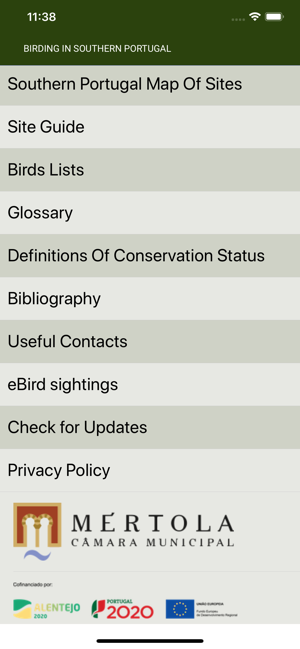價格:免費
檔案大小:235.9 MB
版本需求:系統需求:iOS 9.3 或以後版本。相容裝置:iPhone、iPad、iPod touch。
支援語言:英語

The Iberian Peninsula is a very special region surrounded by water and isolated from the rest of Europe by the Pyrenees, a mountain range that creates a natural barrier between Spain and France. This isolation results in a unique diversity of fauna and flora and when combined with a huge land area that remains substantially rural in character and its position on an important migration path between the African continent and Northern Europe, produces a region that offers a fascinatingly different experience to naturalists of all levels.

Southern Portugal occupies a small, but important, part of the peninsula (the south-west corner) and within its confines all three Iberian endemic bird species, Spanish Imperial Eagle, Iberian Green Woodpecker and Iberian Magpie, the near-endemic Southern Grey Shrike and the breeding near-endemic Iberian Chiffchaff, can be seen without too much difficulty. Yet, compared with many other Western European countries, birdwatching is in its infancy in Portugal and until relatively recently the country has tended to be ignored by the birding fraternity. Only in the past decade or so has realisation dawned that Portugal, and the southern half of Portugal in particular, has an enormous amount to offer.

Southern Portugal (roughly from the latitude of Lisbon (38.713759) to the southern coast of the Algarve) is a compact area with a good infrastructure and a wide variety of habitat types that include coastal cliffs, dunes and beaches, large tidal estuaries, coastal lagoons, reedbeds, salt pans, rice fields, oak woodland, steppe-like land, river gorges and escarpments, all of which hold their own special bird communities. Such a wide range of habitat in a comparatively small area gives rise to exciting opportunities to see a large cross-section of the bird species, both residents and migrants, that make Southern Portugal an increasingly popular destination for visiting birdwatchers. And all without the need to drive long distances. With growing foreign interest and an increasing enthusiasm among the local population towards birdwatching and bird photography, Where to Watch Birds in Southern Portugal has been written as an aid and guide to highlight 24 prime birdwatching sites across the region. Our hope is that the information provided in this guide will encourage and help both foreign and local birdwatchers alike to visit at least some of the sites described and thereby help to ensure the conservation and protection of these and other very special places, as well as the birds that live in them, from the man-made pressures and threats that exist, not only in Southern Portugal but all over the world.

This App was conceived and written specifically for birders who want to explore the region for themselves. Nevertheless, for those who prefer to be guided, there are a number of companies specializing in birdwatching tours, as well as others less specialized but capable of offering guiding services as in the case of boat tours. In any event, it is always prudent to check for companies that are fully licenced to operate.

Texts by:

João Jara – General texts, Sites 3, 6, 8, 14 and 15, lists.

Helder Costa – General texts, Sites 1, 2, 4, 5, 7, 9, 10, 11, 12 and 13, lists.

Ray Tipper – General texts, Sites 16, 17, 18, 19, 20, 21, 22, 23 and 24, lists.

Maps by Joaquim Muchaxo.
支援平台:iPhone, iPad
